stigma and barriers to care - Uniformed Services University of the ...
stigma and barriers to care - Uniformed Services University of the ...
stigma and barriers to care - Uniformed Services University of the ...
You also want an ePaper? Increase the reach of your titles
YUMPU automatically turns print PDFs into web optimized ePapers that Google loves.
Conference Recommendations 103<br />
ment. We have <strong>to</strong> find out what is successful. Then it makes sense <strong>to</strong> do a marketing<br />
campaign.<br />
DR. URSANO: Ron is recommending issues that have <strong>to</strong> do with education or<br />
training. The capability <strong>to</strong> provide evidence-based, effective <strong>care</strong> is critical. If we are<br />
not providing effective <strong>care</strong>, it does not matter how many people we bring in <strong>the</strong><br />
door. We are spending a great deal <strong>of</strong> money without any outcome.<br />
DR. KILPATRICK: I think we need research on how treatment can be made<br />
more palatable <strong>to</strong> people. We need <strong>to</strong> underst<strong>and</strong> what people’s expectations are,<br />
<strong>and</strong> what <strong>the</strong>ir underst<strong>and</strong>ing is <strong>of</strong> <strong>the</strong> treatments that we provide. The pharmaceutical<br />
industry has done a great job <strong>of</strong> convincing people that our problems are<br />
not personal or societal. They are problems in our synapses that particular agents<br />
can address. I wonder what people think about psychological treatments that have<br />
good efficacy. We need <strong>to</strong> find out what causes people <strong>to</strong> come <strong>to</strong> treatment. We<br />
are not explaining what treatment is, so it is mystifying <strong>to</strong> people. Secondly, do we<br />
really know why people come in What would make it more attractive for people<br />
<strong>to</strong> come in<br />
DR. URSANO: Dean has illuminated a multi-step process beginning when someone<br />
first thinks <strong>the</strong>y have a problem. Then <strong>the</strong>y must believe that <strong>the</strong>re is effective<br />
help, <strong>and</strong> <strong>the</strong>n <strong>the</strong>y must be able <strong>to</strong> physically get <strong>the</strong>re. How do <strong>the</strong>y make that last<br />
leap <strong>to</strong> actually going <strong>to</strong> <strong>care</strong><br />
DR. KILPATRICK: I am worried about confidentiality, worried about ruining<br />
my <strong>care</strong>er, people will think I am nuts, so what about coming in<strong>to</strong> <strong>the</strong>rapy is pretty<br />
attractive <strong>to</strong> me In o<strong>the</strong>r words, what are my expectations Do I expect <strong>to</strong> get any<br />
change out <strong>of</strong> this Do I expect <strong>to</strong> get better<br />
Back <strong>to</strong> <strong>the</strong> Viagra thing, I think it is pretty clear why people are willing <strong>to</strong> come<br />
in <strong>and</strong> take Viagra, because <strong>the</strong>y anticipate a pretty specific positive effect. What kind<br />
<strong>of</strong> effects do people expect <strong>to</strong> get out <strong>of</strong> treatment We focused on <strong>the</strong> negatives, but<br />
what are <strong>the</strong> positive things about it<br />
DR. HOBFOLL: We have lost G<strong>of</strong>fman’s original idea <strong>of</strong> <strong>stigma</strong>, which was<br />
<strong>the</strong> purpose <strong>of</strong> <strong>stigma</strong>. It is that a person assigning <strong>stigma</strong> gains status. That is why<br />
<strong>stigma</strong> occurs. No one looks <strong>to</strong> be <strong>stigma</strong>tized. So this is <strong>the</strong> enemy, <strong>and</strong> he is us. The<br />
mental health establishment gains tremendous status by <strong>the</strong> ability <strong>to</strong> diagnose. In<br />
fact, <strong>the</strong>y can even override <strong>the</strong> orders <strong>of</strong> a Comm<strong>and</strong>ing General by <strong>the</strong>ir diagnosis.<br />
That is an incredible amount <strong>of</strong> power, <strong>and</strong> that power rests in <strong>the</strong> Surgeon General’s<br />
<strong>of</strong>fice, <strong>and</strong> <strong>the</strong>y do not want <strong>to</strong> give it up easily.<br />
So, <strong>the</strong> fight in <strong>the</strong> military is <strong>to</strong> move it out <strong>of</strong> <strong>the</strong> realm <strong>of</strong> diagnosis, <strong>and</strong><br />
in<strong>to</strong> <strong>the</strong> realm <strong>of</strong> functioning. Of course, psychiatrists <strong>and</strong> psychologists still have<br />
a tremendous amount <strong>to</strong> contribute <strong>the</strong>re, but <strong>the</strong>y will lose a great deal <strong>of</strong> power<br />
because functioning puts <strong>the</strong> power back in <strong>the</strong> Comm<strong>and</strong>er’s h<strong>and</strong>s.<br />
The one area <strong>of</strong> policy that must be changed for this <strong>to</strong> occur is <strong>the</strong> well-known<br />
picket fence, though not in military parlance. Soldiers get evaluations which ultimately<br />
determine <strong>the</strong>ir rank. If quality evaluations are not perfect, you do not make<br />
rank, so any negative evaluation means really <strong>the</strong> end <strong>of</strong> your being on <strong>the</strong> fast<br />
track. That has <strong>to</strong> end. In great armies in <strong>the</strong> world, including <strong>the</strong> American Army<br />
during World War II, <strong>the</strong> picket fence did not exist, because you promoted based on<br />
performance. Promotion based on <strong>the</strong> st<strong>and</strong>ard <strong>of</strong> 12 perfect evaluations from your<br />
senior <strong>of</strong>ficers produces “yes men <strong>and</strong> women” <strong>and</strong> people who are s<strong>care</strong>d <strong>to</strong> speak<br />
up. Obviously, someone in uniform cannot say that, but I can.<br />
I will discuss recommendations. Moving <strong>to</strong> a coach’s model does not mean that




